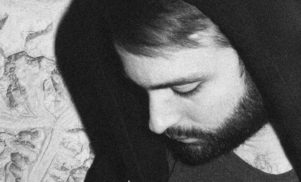May will see Bristol-based dreamer Hyetal follow 2011’s Broadcast with a new album, Modern Worship.
Shifting from Black Acre to the American True Panther imprint, the first single from Modern Worship features vocalist Gwilym Gold, best known for co-developing Bronze, an album listening format that ensures that a record never sounds the same way twice. FACT caught up with Hyetal to talk about the synth-pop that inspired the album, working with Jessie Ware and “trying to build a place that’s completely abstract and escapist.”
You’ve mentioned before that you’re passionate about ’80s alternative pop such as Depeche Mode, The Cocteau Twins and Cure, was this the reason for the focus on Gwilym Gold’s vocals on ‘Northwest Passage’?
“I’m a big fan of pop music in general really. All my favourite music manages to be populist whilst incorporating some experimental ideas, I think there’s a real art to that. The bands you mentioned obviously all balanced that well. I think stuff like Cocteau Twins was referenced more explicitly on the last album, mainly with how I used Alison’s voice. There wasn’t a reference point like that for the tracks I wrote with Gwil. I first approached him about working together because I was a fan of his solo stuff but he ended up developing a very different style for our collaborations. Everything is much more densely layered and built up with various harmonies. He’s acting like another instrument on ‘Northwest Passage’, his parts mimic the other sounds around him.
When talking to FACT about Broadcast, you said there although there were several themes and subjects to the record, you wanted to keep them to yourself and let listeners draw their own conclusions. With Modern Worship, is this still the case?
“I like the idea of music being judged without any connection to the person who made it. I guess you only really achieve that by being totally incognito, which would make playing live awkward so that was never really an option for me. I still like the idea of the music I make being as open to interpretation as possible. I guess I try and build a place that’s completely abstract and escapist. Putting an album together, I have a vague idea of a story or landscape where everything is set but that’s to help me make sense of it, it’s never fleshed out enough to be easily explainable to someone else. That’s also the reason why a lot of the vocals are buried in the mix at times. Literal meaning is not what I’m going for.”
How did the switch to True Panther end up happening with this record?
“Dean [Bein] who runs the label had been in contact for a while and I really respected what he was doing. With Matador behind him he was able to fund a few things I wanted to help step things up a bit for this record. A few other labels were in touch but I felt Dean really understood where I wanted to go with it.”
You seem to have a very strong visual aesthetic for the project, both from the album sleeves and the cinematic feel of the tracks themselves. How important is this to you and your music, and what films or shows have inspired you recently?
“It’s really important everything feels cohesive. There’s a definite aesthetic to everything for me. A few films that spring to mind that I’ve watched recently and have stayed with me are Aguirre, The Wrath Of God, Eyes Wide Shut and Blue Velvet.”
Your music has a sway towards the vintage; from chunky Prince-like Linn Drums to frazzled late-period Tangerine Dream synths, but what new tracks or artists are you excited by at the moment?
“Half of the equipment I use is old gear, all the drum machines on the record I’ve acquired over the years or borrowed from friends. The synths were all made in the ’70s or ’80s but equally a lot of sounds are from the computer and I like them to sound that way. I use soft synths for their digital high end, they’re really good for making stuff sound like glass or metal. All the analogue gear goes through the computer and a lot of it is really sculpted in there. It’s equally reliant on analogue equipment and new software.
“I’m not interested in trying to make a pastiche of anything; my whole life’s influences are always in there. In terms of new music there isn’t a huge amount that’s really grabbed me so far this year [but] there’s still some great stuff about. Brey, Kowton, Bashmore and Peverelist send me some amazing tunes and I’ve been listening to the Thought Forms and Inc. albums quite a bit.”
If you could collaborate with any single vocalist, who would it be and why?
“We did some production for Jessie Ware as Velour recently, which was great. I think with that project there’s a whole bunch of people that would be great to work with. At this point I’m enjoying working with Gwilym and Alison for the music I release as Hyetal. Everything has developed naturally so I’m happy to leave it that way and see what happens.”







































